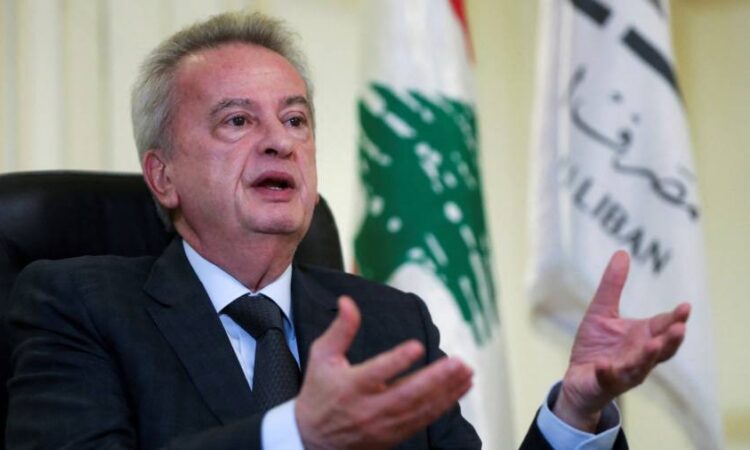
Receive free Lebanon updates
We’ll send you a myFT Daily Digest email rounding up the latest Lebanon news every morning.
The US, UK and Canada have imposed sanctions on Lebanon’s former central bank governor Riad Salameh over allegations that he abused the powers of his office “to engage in a variety of unlawful self-enrichment schemes”.
The sanctions, announced by the US Treasury and UK Foreign Office in statements on Thursday, were imposed 10 days after Salameh stood down from a 30-year tenure at the helm of the Banque du Liban.
The Treasury statement confirmed that the US was acting alongside Canada as well as the UK, “partners who share the United States’ vision of a Lebanon that is governed for the benefit of the Lebanese people and not for the personal wealth and ambition of Lebanon’s elite”.
The Treasury said the action did not apply to the BdL, adding: “Neither the central bank nor its assets should be considered blocked due to today’s action.”
Once praised for steadying Lebanon’s precarious finances through years of instability, Salameh has been the subject of intensifying scrutiny since the country’s financial meltdown in 2019, which has driven three-quarters of the population into poverty.
He has been dogged by allegations of corruption and financial mismanagement at the BdL and is blamed by swaths of the Lebanese public for their misfortunes. The Lebanese pound has lost more than 98 per cent of its value against the dollar since 2019.
Salameh’s “corrupt and unlawful actions have contributed to the breakdown of the rule of law in Lebanon”, the Treasury statement said.
The US also targeted four close associates of Salameh who “helped to conceal and facilitate” his corruption. They are his brother Raja, son Nady, ex-girlfriend Anna Kosakova and assistant Marianne Hoayek. The UK and Canada did not sanction Nady, a British citizen. Canada did not sanction Kosakova.
As a result, all of their assets in the countries sanctioning them will be blocked. The US sanctions also prevent American citizens or lenders from transacting with them. The UK sanctions also include travel bans.
For the past two years, European prosecutors in several countries, including Switzerland, France, Germany, Luxembourg, the UK and Lebanon, have been investigating Salameh, some of his family members and close associates over allegations that they illicitly enriched themselves and laundered hundreds of millions of dollars of public funds for personal gain.
Investigators allege that Salameh and his brother Raja embezzled about $330mn from the central bank between 2002 and 2015 via transactions to Forry Associates, an offshore company owned by Raja.
“Hoayek joined Salameh and Raja in this venture by transferring hundreds of millions of dollars — far more than her official BdL salary accounted for — from her own bank account to those of Salameh and Raja,” said the US Treasury’s Office of Foreign Assets Control (Ofac).
Those funds were then funnelled through layers of shell companies to invest in real estate across European capitals, in Lebanon and New York, via property management companies “registered in the names of either Salameh’s son Nady or Salameh’s former partner Anna Kosakova”, said Ofac.
Ofac also noted another “scheme” in which Salameh allegedly used shell companies in Panama and a trust in Luxembourg to hide his identity as he purchased shares in a company where his son Nady worked as an investment adviser, only to then sell those shares to a Lebanese bank regulated by BdL.
“This sale represents both a conflict of interest as well as a likely violation of a Lebanese law prohibiting employees of the BdL from profiting from other private businesses,” Ofac’s statement said.
In March 2022, more than $130mn in assets linked to the probes were frozen by the EU’s legal agency Eurojust. In May, French financial crimes prosecutors issued a warrant for Salameh’s arrest after he failed to appear at a Paris hearing for questioning in the case. Germany followed suit, with both countries referring the warrants to Interpol.
Both Riad and Raja Salameh have strenuously denied any wrongdoing. Riad Salameh has repeatedly insisted his wealth stems from his previous job as an investment banker and from family inheritance.
Nady Salameh, Kosakova and Hoayek did not immediately respond to requests for comment.
Riad Salameh failed to appear at a hearing in Beirut on Wednesday. He was summoned as part of the Lebanese judiciary’s own investigation, which has repeatedly stalled amid what critics have described as political interference, including the disbarring of a judge who was leading one of the investigations into the former bank chief.
Despite the litany of allegations, he still commands support from some of Lebanon’s powerful political leaders.
“This action demonstrates that no one is beyond accountability,” Barbara Leaf, the US assistant secretary of state for near eastern affairs, said on Thursday. “This is not about one man. We are clear-eyed about the endemic corruption that plagues Lebanon.”
“Riad Salameh and his close associates have stolen from the people of Lebanon and deprived them of resources crucial to its economic and social stability,” said Lord Tariq Ahmad, the UK’s Middle East minister. “The only way to put Lebanon on the path to much-needed economic recovery is for its leaders to stamp out corruption and implement real reforms.”





